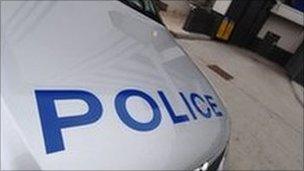Police front line cuts: Your views
- Published

Some police forces in England and Wales face a "big challenge" to make cuts and not lose front-line officers, chief inspector of constabulary Sir Denis O'Connor has said.
Police are losing a fifth of their central funding over four years. The government says this is manageable with greater front-line productivity and savings in back and middle offices.
Some serving officers in the police force have contacted the BBC News website to share their thoughts on the prospect of front line cuts.
Police Constable, London
Morale within the police is at an all time low.
Everyone feels the pinch of the budget cuts, and as a Met officer we have to police the demonstrations without the ability to have our voices heard as we cannot strike and still have to uphold the law.
The Met's plan to tackle the budget is to sell buildings to generate revenue. This means more officers being crammed into already full buildings. Once they are gone they're gone.
PCSOs (police community support officers) have no real powers and do little to help front line officers. In many cases they have to request a police officer to attend anyway. Cutting PCSOs would help save real police on the front line.
Special Constable, West Country
I work as a volunteer Special Constable and have had significant growth in the support given to me by our regular colleagues in the constabularies throughout the UK and in particular in London.
This has enabled Specials to have a more professional standing within each constabulary, however at the cost of creating a significant number of full time posts from the regulars.
Whilst we have seen and enjoyed the benefits, my personal feeling is that some posts could and should be given up so that the availability of front line and key back office functions do not suffer.
We have managed to run ourselves for over 175 years, and a few more years until this crisis is over I'm sure will make little difference.
Restricted Officer, West Midlands
I'm a restricted officer which means I don't patrol the streets because of ill-health, but I work in a specialist role answering non-emergency calls and offering advice to other police officers and the public.
We have lost a number of control staff who make life and death decisions and send front line officers to emergency call outs. This was a specialist role and cannot easily be filled as there is an enormous amount of training involved.
Most officers with over 30 years service have now been forced to leave, this has left gaps in the office which cannot be back filled and has put extra pressure on the staff left. Officers on the front line, attending the incidents do not get the vital information they need and in a timely manner because there is less staff.
When members of the public wish to report anti-social incidents, most being elderly and have no access to computers, they have to wait on the phone for longer, only to find we have no officers to send.
This is very frustrating for the police and public. Police officers and staff members are working under enormous pressure to make good these gaps so the public get a service they deserve.
Detective Inspector, London
The definition of front line policing troubles me. I am in charge of a busy sexual offence team comprising of 22 officers and have no direct contact with the public.
I do however have vast experience in this complex field of criminal investigation. I set strategies and ensure all investigative opportunities are considered for my team's work.
Is my role less important than that of a uniformed PC? I am likely to be forced to retire soon although I thoroughly enjoy my work. Is 30 years of detective experience not worth retaining?
Police Constable, Scotland
I don't doubt that there will be a reduction in support staff or fewer officers on the beat. If there are no support staff, their jobs still need to be done. If there is no typist and a report needs to be typed, the report will have to be typed up by officers instead.
I am shocked and disgusted by some comments made by members of the public about police officers. The vast majority of officers do not want to work overtime but, if an incident happens, we cannot just walk away. If an incident occurs we often do not have the resources to allow for breaks - in fact recently I started a shift at 0700 and finished at 1800, I had nothing to eat all day as there was no available staff to relieve me.
We are shouted, sworn, spat at and assaulted at work. If this happened to anyone else this would constitute a criminal offence but in this day and age of 'anti-police' feeling, this is acceptable and is not taken on by the courts. The public have no idea about our situation, and we're vilified without cause.
- Published30 March 2011
- Published29 March 2011
- Published10 March 2011